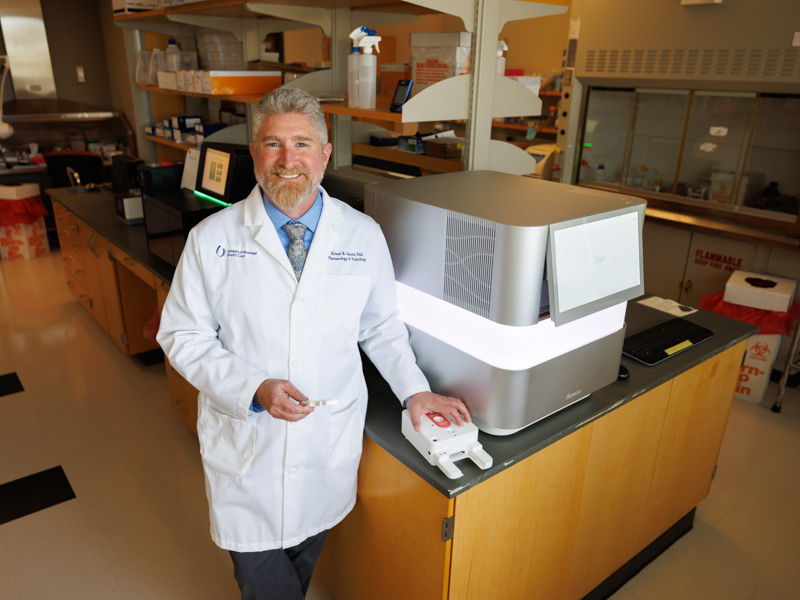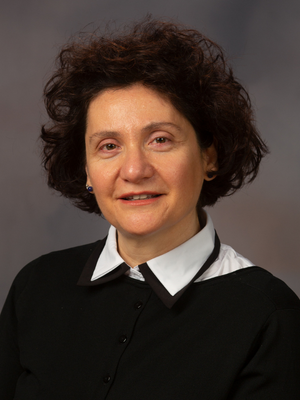New center to study genetic origins of diseases, innovative treatment

A new research center at the University of Mississippi Medical Center will arm researchers with tools to study health and diseases at the molecular level – where they start – with the goal of developing new treatments.
The Molecular Center of Health and Disease, funded by an $11.5 million Centers of Biomedical Research Excellence (COBRE) grant, will help scientists better understand genetic susceptibility and factors that cause disease, enabling them to create earlier interventions and cures. The key to much of the innovation is in studying the genome, the set of DNA instructions in a cell that contains the information we need to develop and function, according to the National Human Genome Research Institute.
“Our genomes, along with interactions with our environment, make us who we are – the way we look, act, think – and it dictates our general health as well as our susceptibility to develop disease,” said Dr. Michael Garrett, MCHD director and professor of pharmacology. “An understanding of our genome provides important information that can lead to quicker and better diagnosis of disease and more tailored treatment for when we become sick.” The MCHD has the potential to make a significant impact in Mississippi, which consistently ranks at or near the bottom in every major chronic health condition. Of the top 10 leading causes of death, the state ranks first or second in eight, including first in heart disease, kidney disease and Alzheimer’s and second in cancer, stroke, diabetes, influenza and sepsis, according to the Centers for Disease Control and Prevention.
In 2015, 90 percent of Mississippians had at least one chronic disease.
Garrett hopes that by applying innovative molecular technology and computational biology to enhance research in understanding the health-disease continuum, the center will be able to help Mississippians lead healthier lives.
“The status of our health and disease can fluctuate throughout life,” he said. “While chronic diseases, such as heart disease, diabetes, and cancer can be treated, an understanding of genetic contribution and mechanisms involved in the start of disease has the potential to halt progression and return an individual to a healthy state.”
Phase 1 of the grant, which spans five years, will focus on strengthening the existing UMMC genomic infrastructure, adapting new technologies such as gene-editing and building new computing and analysis capabilities. COBRE awards consist of three sequential five-year phases.

Dr. Joey Granger, associate vice chancellor of research and dean of the School of Graduate Studies in the Health Sciences, said the MCHD is the third UMMC center made possible by the Institutional Development Award, a congressionally mandated program that builds research capacity in states with historically low levels of funding from the National Institutes of Health.
That the Medical Center is now home to three IDeA centers is no small feat, said Granger.
“Our success in receiving COBRE funding highlights the quality of our researchers as well as the critical need for research faculty development and infrastructure improvements at UMMC,” he said. “The MCHD will enhance training, mentorship and research support to generate unique opportunities in the application of omics [scientific fields associated with measuring biological molecules] technology and computational biology.”
The MCHD is not replacing UMMC’s Molecular and Genomics Core Facility, which provides expertise to researchers at the Medical Center and throughout the region. Instead, the core facility, which Garrett established in 2010, is “the nucleus” of the new center, providing the technology and expertise to explore molecular questions associated with each research project.
Dr. Babbette LaMarca, chair of the Department of Pharmacology and Toxicology, said the center’s technology will help UMMC continue to make life-saving advancements.

“We will continue our long-standing support for the Molecular and Genomics Core, which is the hub of technology that drove many of the ideas fueling this newly-funded machine,” said LaMarca. “The investment in this type of center will provide avenues to help us attract new investigators and train young investigators with expertise in genomics and proteomics who will hopefully work with our physicians to provide better health care for all of us in Mississippi.”
The center consists of three main components: administrative; omics and gene-editing; and research computing, bioinformatics and biostatistics. It will also fund three junior researchers.

Dr. Jorge Vidal, associate professor of cell and molecular biology and one of the research project investigators, said the center will give him the tools to contribute to a better understanding of pneumococcal pneumonia, a deadly infectious disease.
“It will also allow us to train graduate students and postdocs with world-class technology,” said Vidal. “We will consolidate our research programs at UMMC, and this funding will ultimately allow us to generate more exciting data to attract NIH-level funding.”

Dr. Barbara Gisabella, assistant professor of psychiatry and human behavior, also a project leader, studies the involvement of sleep disturbances in memory dysfunction in psychiatric disorders. Her goals are to construct a database of molecular pathways to strengthen emotional memories during sleep, and long-term, after identifying molecules involved in emotional memory dysfunction in psychiatric disorders and aging, use that knowledge to develop new therapeutic targets.
“This is such a wonderful opportunity for my research,” said Gisabella. “It will allow us to incorporate cutting-edge approaches with Dr. Garrett and the Molecular and Genomics Core and make significant advances in our studies that would not be possible without this funding. We are very excited for these studies.
“In the broader context, the state-of-the-art resources that this funding will support will be a great benefit for all researchers here in Mississippi for decades to come and opens up a wide range of opportunities.”


